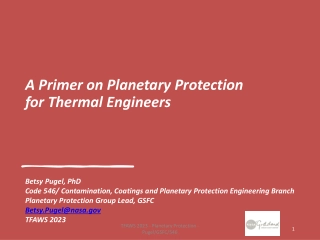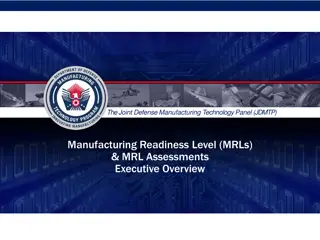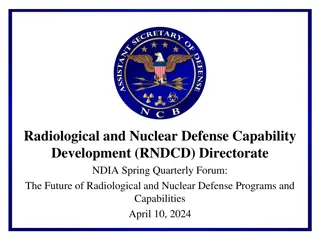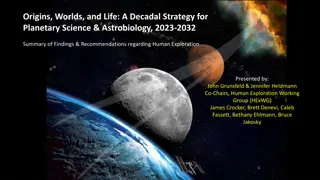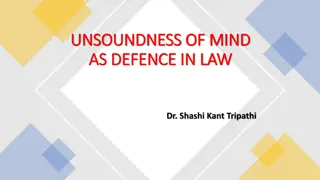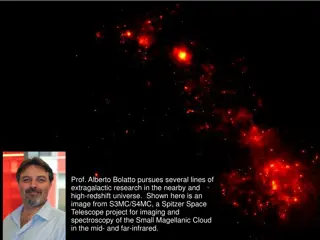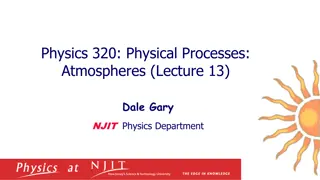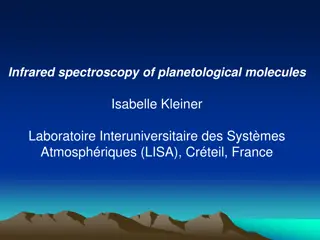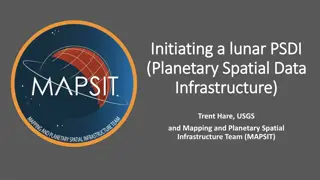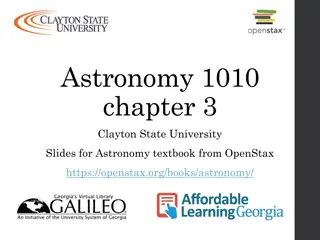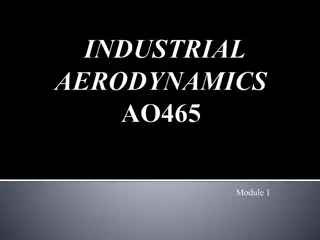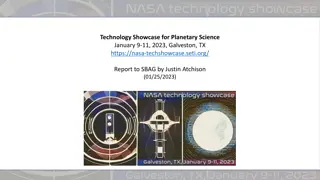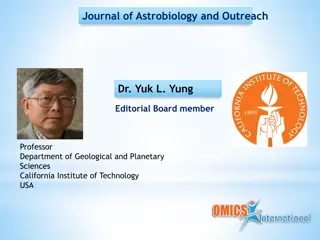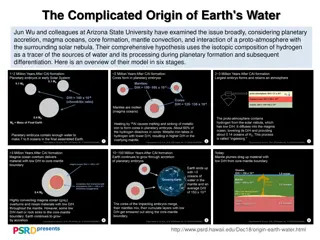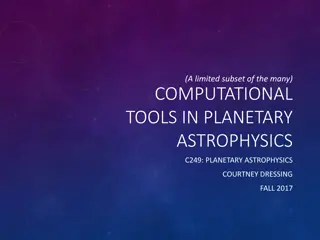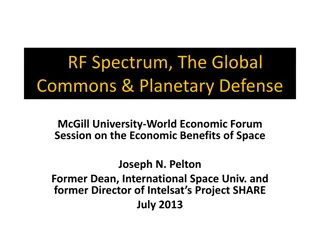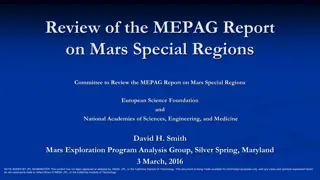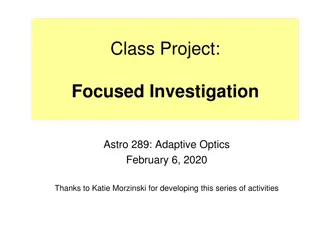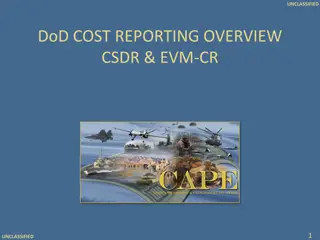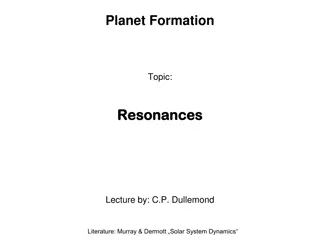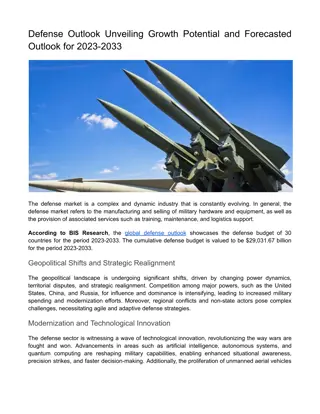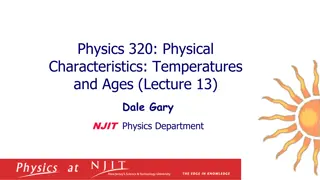❤[PDF]⚡ Planetary Ring Systems (Springer Praxis Books)
\"COPY LINK HERE ; https:\/\/getpdf.readbooks.link\/B001941UHI\n\n[PDF READ ONLINE] Planetary Ring Systems (Springer Praxis Books) | Planetary Ring Systems (Springer Praxis Books)\n\"\n
0 views • 6 slides
A Primer on Planetary Protection for Thermal Engineers
Delve into the realm of planetary protection with this comprehensive primer tailored for thermal engineers by Betsy Pugel, PhD. Explore the intersection of thermal and planetary protection, flight project practicalities, and the crucial components of forward and backward contamination. Gain insights
1 views • 48 slides
Understanding Manufacturing Readiness Levels (MRLs) in Defense Technology
Manufacturing Readiness Levels (MRLs) are a vital tool in assessing the manufacturing maturity and associated risks of technology and products in defense acquisitions. They provide decision-makers with a common understanding of the maturity levels to support informed decisions throughout the acquisi
1 views • 12 slides
Army Rapid Capabilities and Critical Technologies Office Symposium 2023
LTG Robert A. Rasch, Jr., U.S. Army Director of Hypersonics, Directed Energy, Space, and Rapid Acquisition, presented updates on various defense projects at the Space and Missile Defense Symposium 2023. Topics included the Long Range Hypersonic Weapon program, Mid-Range Capability development, and D
5 views • 11 slides
Understanding Manufacturing Readiness Levels (MRLs) in Defense Acquisition
The Joint Defense Manufacturing Technology Panel (JDMTP) establishes Manufacturing Readiness Levels (MRLs) as a risk identification tool for assessing the manufacturing maturity, risks, and capabilities related to defense technology production. MRLs provide decision-makers with a common understandin
2 views • 14 slides
Future of Radiological and Nuclear Defense Programs and Capabilities
The Radiological and Nuclear Defense Capability Development Directorate discusses the responsibility for modernizing and procuring defense capabilities in the face of radiological and nuclear threats. The Department of Defense outlines strategic priorities to ensure the ability to survive and prevai
1 views • 10 slides
Transforming NLP for Defense Personnel Analytics: ADVANA Cloud-Based Platform
Defense Personnel Analytics Center (DPAC) is enhancing their NLP capabilities by implementing a transformer-based platform on the Department of Defense's cloud system ADVANA. The platform focuses on topic modeling and sentiment analysis of open-ended survey responses from various DoD populations. Le
0 views • 13 slides
Exploration Strategy for Planetary Science & Astrobiology 2023-2032
The decadal strategy outlines a comprehensive plan for planetary science and astrobiology, emphasizing the integration of human exploration activities with scientific objectives. Key elements include leveraging planned human space missions for new scientific opportunities and identifying areas of pl
9 views • 10 slides
Essential Self Defense Tips and Techniques for Personal Safety
Explore the world of self-defense with insights from BJJ Black Belt Alex Vamos. Learn about physical and mental self-defense, enhancing awareness, important skills to master, assessing safety in hangout spots, and trusting your instincts to stay safe from potential threats.
3 views • 24 slides
Graduate School Defense Committee Guidelines
Comprehensive guidelines for thesis/dissertation defense committees at The Graduate School, SUNY ESF. Includes details on committee structure, purpose of defense, roles of members, scheduling, and more.
1 views • 15 slides
Understanding Unsoundness of Mind as a Defense in Law
The concept of unsoundness of mind as a defense in law is explored through principles of criminal liability and historical legal perspectives. The defense under Section 84 of the Indian Penal Code provides immunity for acts committed by individuals incapable of understanding the nature of their acti
1 views • 20 slides
Addressing Controversial Topics in Planetary Science
Explore the challenges of addressing controversial topics in planetary science during public engagement, including misunderstandings about science and the nature of scientific inquiry. Discover solutions and engage in activities to enhance public understanding.
0 views • 15 slides
Fascinating Research in Astrophysics and Planetary Science
Prof. Alberto Bolatto explores extragalactic research, Prof. Drake Deming studies extrasolar planets, Dr. Tony Farnham specializes in cometary studies, Lori Feaga maps cometary gas comae, Prof. Suvi Gezari investigates supermassive black holes, and Prof. Douglas Hamilton delves into planetary dynami
0 views • 23 slides
Defense Presentation of "TITLE OF DISSERTATION" by Doctoral Candidate
This presentation features the defense process of a dissertation by a doctoral candidate, covering aspects such as the problem statement, theoretical framework, research questions, methodology, and findings. The defense includes committee introductions, dissertation presentation, audience questions,
0 views • 12 slides
The Green Economy Progress Measurement Framework Overview
The Green Economy Progress (GEP) Measurement Framework, spearheaded by Fulai Sheng, a Senior Economist at UN Environment, emphasizes an Inclusive Green Economy (IGE) as a tool for sustainable development. It addresses poverty, inequitable prosperity sharing, and planetary boundary concerns by integr
0 views • 6 slides
Understanding Atmospheric Physics: Ideal Gas Law and Maxwellian Distribution
Exploring the physics of gases in planetary atmospheres, this lecture delves into the ideal gas law which relates pressure, density, and temperature in an atmosphere. It introduces the concept of kinetic temperature and Maxwellian distribution, showcasing how gas particles distribute in equilibrium.
0 views • 12 slides
SAASTA AstroQuiz 2017 Round 3: Planetary Knowledge Challenge
Participate in the SAASTA AstroQuiz 2017 Round 3 and test your planetary knowledge with a series of questions related to various celestial bodies. You have 60 seconds to answer each question. Use the provided image for reference and enjoy the space-themed quiz! Remember, no internet or cellphones al
0 views • 34 slides
Understanding Planetary Gear Trains in Hybrid Powertrains
Hybrid powertrains utilize planetary gear trains to achieve different operating modes such as motor-alone, engine-alone, combined mode, and more. These gear trains consist of planetary gears orbiting around a central axis, enabling multiple shaft configurations for input and output. Understanding th
0 views • 55 slides
Understanding Planetary Health, Climate Change, and Pandemics
This educational content delves into the concepts and principles of planetary health and climate change, exploring the interrelationships between ecosystems, animals, and human health. It highlights the far-reaching effects of human and animal interactions on the environment, emphasizing practical i
0 views • 20 slides
Insights into Infrared Spectroscopy of Planetary Molecules and Space Exploration
Infrared spectroscopy plays a crucial role in studying planetary molecules like NH3, PH3, and CH3CN, aiding in planetary observations and spacecraft missions. Ground-based observatories and spacecraft like GALILEO and Cassini/Huygens provide valuable data for analyzing planetary spectra and modeling
0 views • 13 slides
Initiating a Lunar Planetary Spatial Data Infrastructure (PSDI) by MAPSIT Steering Committee
MAPSIT, led by Trent Hare of USGS, advocates for creating a Lunar PSDI to enhance spatial data infrastructure in planetary science. The committee highlights the importance of foundational lunar data products and ongoing efforts for Europa and the Moon. Collaboration with various entities is emphasiz
0 views • 10 slides
Johannes Kepler and His Revolutionary Laws of Planetary Motion
Johannes Kepler, a pivotal figure in the history of astronomy, made groundbreaking discoveries by overturning the geocentric model of the universe. By formulating his three laws of planetary motion, Kepler paved the way for scientific advancements and paved the path for Isaac Newton's law of gravity
0 views • 12 slides
Understanding Newton's Law of Gravitation and Kepler's Laws of Planetary Motion
Explore the gravitational constant, force of attraction between objects, and equations for calculating gravitational force and centripetal force. Delve into Kepler's laws describing planetary orbits. Uncover the relationship between periods and distances of planets from the sun.
0 views • 9 slides
Crafting Persuasive Defense Theories for Trial Success
Explore the art and science of cross-examination, theory development, and defense strategies in trial storytelling. Learn the essential components of a compelling defense theory, emphasizing factual, legal, and emotional aspects. Discover examples illustrating effective defense strategies for presen
0 views • 35 slides
Understanding the Planetary Boundary Layer in Atmospheric Science
The Planetary Boundary Layer (PBL) plays a crucial role in atmospheric dynamics, divided into surface, mixed, stable, and residual layers. During the day, the mixed layer experiences convective motions due to surface heating, while the stable layer dominates during the night. Understanding these lay
0 views • 18 slides
Successful Technology Showcase for Planetary Science - A Networking Triumph
Attendees of the Technology Showcase for Planetary Science, held in Galveston, TX, praised the event for fostering connections between technologists and mission planners. Organized by Carolyn Mercer and Doris Daou, this innovative gathering aimed to enhance future mission science returns through col
0 views • 9 slides
Dr. Yuk L. Yung - Professor of Astrobiology and Planetary Sciences
Dr. Yuk L. Yung is a distinguished editorial board member and professor at the California Institute of Technology, USA. His research focuses on planetary evolution, atmospheric chemistry, astrobiology, and global change, emphasizing synergistic interactions between modeling, experiments, and observa
0 views • 21 slides
Understanding Kepler's Laws of Planetary Motion
Explore the fundamental laws discovered by Johannes Kepler in his study of planetary motion. Learn how these laws revolutionized our understanding of the solar system, from the elliptical orbits to the equal area law. Discover the key concepts of focus, eccentricity, aphelion, and perihelion, sheddi
0 views • 21 slides
Understanding Universal Gravitation and Planetary Motion
Explore the principles of Newton's Law of Universal Gravitation and Kepler's Laws of Planetary Motion. Delve into the concept of gravitational attraction between celestial bodies and the validation of these laws through the conservation of angular momentum. Learn about the measurement of the gravita
0 views • 20 slides
The Complicated Formation of Earth's Water: A Detailed Overview
Jun Wu and colleagues at Arizona State University have developed a comprehensive model to explain the origin of Earth's water through stages such as planetary accretion, core formation, and interactions with the solar nebula. By tracing the isotopic composition of hydrogen, they explore how water so
0 views • 7 slides
Computational Tools in Planetary Astrophysics - Fall 2017
Explore a limited subset of computational tools in planetary astrophysics used for modeling planetary transits, secondary eclipses, phase curves, radial velocities, Bayesian parameter estimation, and atmospheric modeling. Tools include BATMAN, SPIDERMAN, RadVel, e.emcee, and Exo_Transmit, each servi
0 views • 7 slides
Sustainable Procurement Practices in Defense Department
Sustainable procurement practices play a crucial role in the Defense Department, focusing on reducing emissions, enhancing eco-labeling, and promoting administrative cooperation. Initiatives such as reciprocal defense procurement agreements and memoranda of understanding with qualifying countries co
0 views • 85 slides
The Fascinating Story of Pluto: Discovery, Naming, and Its Planetary Status
In 2006, Pluto was reclassified as a dwarf planet, sparking debates about its planetary status. Discovered in 1930 by Clyde Tombaugh, Pluto was named after the Roman god of the underworld by an 11-year-old girl. Its composition and size differentiate it from the traditional outer planets, contributi
0 views • 5 slides
The Economic Importance of Space Technology and Planetary Defense
Space technology plays a crucial role in global economics by addressing cosmic threats, climate change, and atmospheric issues. The protection of global resources like RF Spectrum, the Ozone Layer, and the Van Allen belts is essential for human survival. Potential risks from orbital debris, solar fl
0 views • 10 slides
Review of MEPAG Report on Mars Special Regions Committee
The MEPAG Report on Mars Special Regions Committee was established by joint requests from ESA, ESF, and NASA to review planetary protection requirements for Mars. The Academies and ESF play a crucial role in providing independent scientific advice. The Joint Committee comprises experts from various
0 views • 14 slides
Exploring Adaptive Optics Systems in Astronomy: Comparative Analysis of AO Systems for HR 8799 Planetary System
Delve into the world of adaptive optics (AO) systems through a focused investigation on imaging the HR 8799 planetary system. Compare and contrast different AO systems, discuss science goals and design choices, and analyze observational details and results. Explore which AO system is optimal for HR
0 views • 27 slides
Defense Cost Reporting and Systems Overview
Defense Cost Analysis and Reporting Systems (CSDR) provide the cost community with essential data for developing independent cost estimates within major defense acquisition programs. The Defense Automated Cost Information Management System (DACIMS) offers instant access to historical cost informatio
0 views • 19 slides
Understanding Resonances in Planet Formation
Resonances play a crucial role in planetary systems, where characteristic frequencies align to produce dynamical consequences. Mean motion resonances, spin-orbit resonances, and secular resonances are key examples influencing planetary dynamics. Explore resonant angles, resonant arguments, and examp
0 views • 17 slides
Defense Outlook Unveiling Growth Potential and Forecasted Outlook for 2023-2033
The global defense outlook showcases the defense budget of 30 countries for the period 2023-2033. The cumulative defense budget is valued to be $29,031.67 billion for the period 2023-2033.\n\nRead Report Overview: \/\/bisresearch.com\/industry-report
1 views • 3 slides
Understanding Surface Temperatures and Albedo in Planetary Systems
Surface temperatures and albedo play significant roles in understanding planetary characteristics. Albedo, the fraction of sunlight reflected from a planet's surface, varies among planets. By considering factors like albedo, distance from the Sun, and energy flux, we can estimate surface temperature
0 views • 10 slides
![❤[PDF]⚡ Planetary Ring Systems (Springer Praxis Books)](/thumb/21506/pdf-planetary-ring-systems-springer-praxis-books.jpg)
